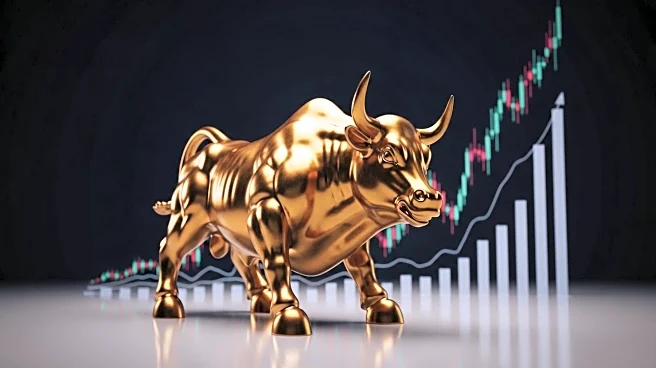What is the story about?
What's Happening?
Goldman Sachs has reported better-than-expected quarterly earnings, with revenue for the third quarter rising 19.6% year over year to $15.18 billion, surpassing the consensus estimate of $14.1 billion. Earnings per share increased by 45.8% to $12.25, exceeding the $11 estimate. Despite the strong financial performance, Goldman Sachs shares initially dropped over 5.5% due to profit-taking and concerns over U.S.-China trade tensions. However, the stock rebounded as the market turned positive. The investment bank has upgraded its stock rating to a buy-equivalent and raised its price target from $750 to $850 per share. Goldman Sachs is optimistic about future growth, driven by increased IPOs, mergers and acquisitions, and a favorable regulatory environment under President Trump.
Why It's Important?
The strong earnings report from Goldman Sachs highlights the resilience of major financial institutions amid global economic uncertainties. The bank's performance is a positive indicator for the financial sector, suggesting potential growth in investment banking and alternative assets. The upgrade in stock rating and increased price target reflect confidence in Goldman Sachs' ability to capitalize on market opportunities, particularly in dealmaking and advisory services. This development is significant for investors and stakeholders, as it suggests a robust outlook for the financial industry, potentially influencing investment strategies and market dynamics.
What's Next?
Goldman Sachs plans to continue expanding its alternative investment platform, with the acquisition of Industry Ventures expected to close in the first quarter of 2026. The bank aims to leverage deregulation and a supportive regulatory environment to enhance its investment banking operations. As trade negotiations with China progress, Goldman Sachs anticipates further growth in IPOs and M&A activities, which could drive higher valuation multiples and stock performance. Investors will be closely monitoring these developments, as well as the broader economic conditions influenced by Federal Reserve policies and global trade dynamics.
Beyond the Headlines
Goldman Sachs' strategic focus on alternative assets and investment banking reflects broader trends in the financial industry, where firms are diversifying portfolios to mitigate risks and capitalize on emerging opportunities. The bank's emphasis on disciplined risk management and client service underscores the importance of navigating market cycles and technological advancements, such as AI infrastructure investments. This approach may set a precedent for other financial institutions, highlighting the need for adaptability and strategic foresight in a rapidly evolving economic landscape.















